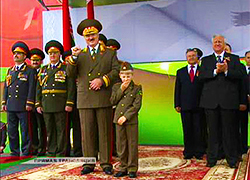Kolkhoz boomerang
42- Natallia Radzina, Gazeta Wyborcza
- 8.08.2014, 10:56
- 125,180

It seems like the policy of pacifying neighboring dictators comes back to Europe like a boomerang.
“We did not use Lukashenka’s ambitions” – under such a title came out an article by Filip Memches, a journalist of one of the largest Polish newspapers Rzeczpospolita.
The author saw “two sides of a coin” in Lukashenka’s brutal and bloody rule. Not fearing the controversies Memches writes that one the one hand Lukashenka rigs votes and deals brutally with opposition, and on the other hand he enjoys broad support of the population and is the guarantor of a stable situation in the country. At the same time the author is not asking himself the question of why rig the votes, kill opposition leaders and throw thousands Belarusians in jails if the “support is broad” and “the situation is stable”.
This utterance by Memches made me recollect the recent statement by Hungary’s Prime Minister and Vladimir Putin’s new friend Viktor Orban.
When meeting the Hungarian diaspora in Romania in July Orban claimed that he was no longer going to follow the liberal democracy model in his policy. According to him, the examples of such countries as Singapore, China, Russia, India and Turkey prove that it is possible to be successful in the world arena by being an autocracy.
At the first look it may seem that Orban has gone crazy for speaking of success of the model of, say, Russia, with the growing isolation of Putin’s regime in the background due to the war he wages on Ukraine. However, it is not all that simple. Obvious is the dangerous tendency in the European politics, and Filip Memches’ article in the Rzeczpospolita falls into the same category.
“Not only all bad is related to well-known Adolf Hitler in Germany. The Germany of the 1930-ies is what corresponds with our understanding of a presidential republic and president’s role in it”, - Lukashenka said in an interview with Handelsblatt newspaper that was aired on the Belarusian radio at the beginning of his term. These words of his were followed by the murders of the parliament’s vice-speaker Hienadz Karpenka, the head of the Central Elections Commission Viktar Hanchar, former Minister of Internal Affairs Jury Zakharanka, a businessman and a public figure Anatol Krasouski, a journalist Dzmitry Zavadski, then – by completely rigged elections, brutal crackdowns on protest manifestations, shutting down of independents media, new murders and mass arrests of dissidents.
And today European politicians and intellectuals claim some success of the Russian and Chinese dictatorship models, and a journalist of one of Poland’s leading newspapers does not spare compliments for the Belarusian tyrant and urges the authorities of his country to use his ambitions in order “to win something” in the eastern policy.
What ambitions does the chairman of a backward collective farm Lukashenka have apart from terrorizing its own people and destroying Belarusian culture? Russian troops are deployed in the territory of Belarus today, Russian fighter jets and heavy artillery have been deployed at the border with Ukraine. In the UN official Belarusian delegation votes for the recognition of the annexation of Crimea, and the dictator himself is proud to have become an initiator of the creation of the Eurasian Union.
It is striking how fast the citizens of the countries, that very recently lived under dictatorships, get used to freedom, lose the guidelines and stop being able to tell black from white.
Maybe it was not all that bad in Poland under the Communist dictatorship and the Poles liked living under the Soviet occupation?
The number of policemen in today’s Belarus is 7 times higher than it was in the USSR, leave alone the multiple secret services. With that in mind, can we claim that Belarusians like living under the dictatorship and Lukashenka “enjoys significant popular support”?
Once I was surprised that Polish liberals compared the Kaczynski brothers, who came to power then, with… Lukashenka, although he did not enter NATO or EU, but was restoring the Soviet Union.
Having lived in Poland for several years, I have understood that the standoff between the two parties, which originate from the Solidarity, is very tough. But more conservative, or more liberal – it is still a democracy, and it is great luck that the parties are able to freely compete one with another. Why then instead of promoting democracy in the east, the competing parties start looking for allies in the neighboring concentration camps?
Europeans stubbornly won’t notice today that their famous “stability arch”, made of dictatorships and spreading from Maghreb to Kaliningrad region, has turned into European Union’s burning border.
They should know better to see that using the ambitions of the kolkhoz Bonaparte Lukashenka does not take a bad turn on Poland.
Natallia Radzina, Charter97.org web-site’s chief editor, former political prisoner, specially for Gazeta Wyborcza









